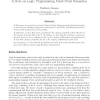Free Online Productivity Tools
i2Speak
i2Symbol
i2OCR
iTex2Img
iWeb2Print
iWeb2Shot
i2Type
iPdf2Split
iPdf2Merge
i2Bopomofo
i2Arabic
i2Style
i2Image
i2PDF
iLatex2Rtf
Sci2ools
AGP
1993
IEEE
1993
IEEE
A Note on Logic Programming Fixed-Point Semantics
In this paper, we present an account of classical Logic Programming fixed-point semantics in terms of two standard categorical constructions in which the least Herbrand model is characterized by properties of universality. In particular, we show that, given a program P, the category of models of P is reflective in the category of interpretations for P. In addition, we show that the immediate consequence operator gives rise to an endofunctor TP on the category of Herbrand interpretations for P such that category of algebras for TP is the category of Herbrand models of P. As consequences, we have that the least Herbrand model of P is the least fixed-point of TP and is the reflection of the empty Herbrand interpretation.
AGP 1993 | Artificial Intelligence | Herbrand Interpretation | Herbrand Model | Standard Categorical Constructions |
Related Content
| Added | 08 Aug 2010 |
| Updated | 08 Aug 2010 |
| Type | Conference |
| Year | 1993 |
| Where | AGP |
| Authors | Vladimiro Sassone |
Comments (0)

